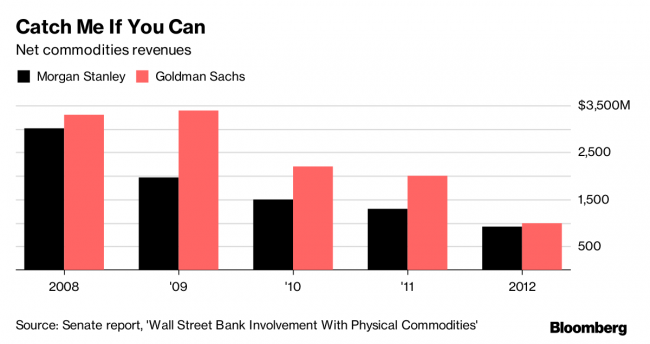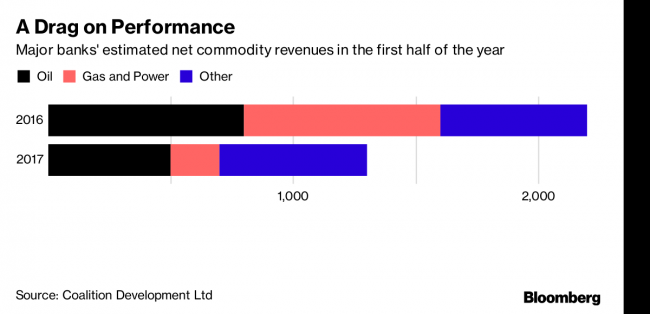(Bloomberg) -- For nearly three decades, Goldman Sachs Group Inc (NYSE:GS). outdid Morgan Stanley (NYSE:MS) in commodities, year after year. In 2017, Morgan Stanley is pulling ahead in a reversal of fortunes for the two banks known as the "Wall Street refiners."
The battle for the crown as the top U.S. commodities bank is being fought far away from the white-shoe world of Manhattan bankers: from obscure markets for gas in Pennsylvania to electricity grids in Texas, and power stations in between.
Goldman has lost money this year in U.S. gas and power trading, turning 2017 into its worst year for commodities since it became public nearly two decades ago, according to people familiar with the matter. In contrast, a slimmed-down commodities operation at Morgan Stanley has successfully weathered the difficult market, people familiar with the bank said, asking not to be named discussing internal matters.
For the two banks, the battle of trading strategies has a personal edge: Lloyd Blankfein of Goldman cut his teeth dealing metals and has stood by his large commodities unit while competitors cut people and capital. Morgan Stanley’s James Gorman took the opposite approach, selling large parts of the bank’s oil business in 2014-15 in a simpler-is-better bet that’s paying off now.
"They got out near the top, and Goldman and others have been more adversely impacted by the slowdown," said Craig Pirrong, a business professor at the University of Houston, of Morgan Stanley’s decision to reduce the size of its business. "2014-2015 was a peak in oil trading overall, so in that the cutback seems well-timed."
Energy Losses
Losses in natural gas and power trading were the major driver of the dire performance at Goldman’s commodities division this year, according to people familiar with the matter. The unit, which at its peak made $3.4 billion in a year, had net revenues of less than $200 million in the first nine months of this year, according to public statements from company executives and people familiar with the matter.
Morgan Stanley, on the other hand, has outperformed. The bank has made net revenues of about $400 million to $500 million so far this year, according to a person familiar with the matter. About half of that has come from gas and power, the person said.
"Gas prices have been low and there hasn’t been any volatility," said Amrit Shahani, research director at Coalition Development Ltd., an analytics firm that compiles estimates of banks’ commodities performance. "There aren’t many traders who have got it right."
Morgan Stanley’s success comes against a backdrop of drastically shrinking revenues across the sector in recent years. Commodities revenues across major banks have fallen from a peak of over $14 billion in 2008 to just $1.3 billion in the first half of this year, according to Coalition data.
Goldman is not alone in having a tough time navigating the gas and power markets. Benchmark gas prices have been stuck in a range of 86 cents per million British thermal units all year, the narrowest band in decades, thanks to record production, mild weather and competition from alternative electricity sources.
According to estimates from Coalition, net revenues in gas and power trading across 12 top investment banks fell 75 percent in the first half of 2017 from a year earlier. That outpaced a 41 percent drop in overall commodities trading revenues.
Morgan Stanley and Goldman both declined to comment.
Old Rivalry
For more than two decades, Goldman and Morgan Stanley were the dominant banks in commodity markets. But Morgan Stanley, despite a large physical oil trading business which competed with trading houses like Vitol Group and Glencore (LON:GLEN) Plc, consistently made less money in commodities than its Wall Street rival.
From 2008 to 2012, for example, Goldman outperformed Morgan Stanley every year in net revenues from commodities, according to performance data that was disclosed as part of a Senate investigation into banks’ activities in commodities markets. Goldman’s commodities performance was on average about a third higher than its Wall Street rivals, according to a Bloomberg analysis of the data.
Then, under pressure from new regulations and scrutiny of its physical trading business, Morgan Stanley drastically shrank its commodities unit. It sold its stake in oil-transportation company TransMontaigne in 2014 and the following year sold its physical oil merchanting business, refocusing the business on the bank’s clients.
Goldman’s Blankfein, on the other hand, publicly endorsed the commodities business, arguing that the downturn in profitability was cyclical and the bank would be well-placed to benefit from an eventual rebound in activity.
Blankfein has stuck to his guns so far this year, spearheading a hiring spree at the commodities unit and trying to win more business from the bank’s clients. But Goldman’s poor performance has triggered an informal review led by securities division co-head Isabelle Ealet, who ran the commodities unit for five years until 2012.
On the other hand, Morgan Stanley’s strong performance has boosted the profile of Nancy King, a former oil trader who was promoted to run commodities in 2015. The bank’s performance this year has put it ahead of other rivals such as JPMorgan Chase & Co (NYSE:JPM). and Citigroup Inc (NYSE:C). in commodities, according to industry executives and consultants. It is only behind Macquarie, which is set to take the crown of leading commodities trader from Goldman this year, the same people said.
Losing Traders
Goldman’s struggles in gas and power have not been helped by the loss of some of the bank’s top traders. Gregory Agran, global head of commodities and a former head of North American gas and power trading, is set to leave the firm this month. Other departures this year include Owen West, global head of natural gas trading and co-head of global power trading, and Teoman Guler, head of U.S. power trading.
Goldman is hoping a former Morgan Stanley trader can help reverse its fortunes in the sector: it has hired Nitin Jindal as a partner to head North American natural gas and power trading, Bloomberg reported last month.
The exodus at Goldman underscores a broader generational shift in commodities banking, as a decline in profitability in the sector sees older traders who enjoyed years of booming profitability give way to a younger generation.
Henrik Sukonnik, a managing director who focuses on gas and power trading for recruiter H.W. Anderson Ltd, said Morgan Stanley had managed a turbulent few years for the commodities business better than its Wall Street rival.
"They have gone through major changes. They’ve had senior people leave or let go but they had younger talent that they brought in," he said.
(Adds context on gas markets in 10th paragraph.)


